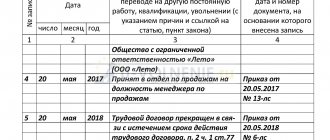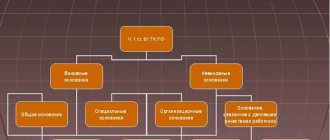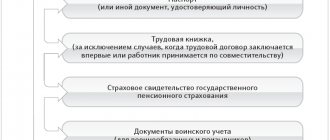Registration of termination of an employment contract (Article 84.1 of the Labor Code of the Russian Federation)
Rules for using services and information
users of the electronic services system “Onlineinspection.rf”
The rules for the use of services and information by users (hereinafter referred to as the Rules) of the system of electronic services “Onlineinspektsiya.rf” (hereinafter referred to as the System) apply to all electronic services of the System, without exception, accessed through sections and pages of the Internet portal https://onlineinspektsiya. RF (hereinafter referred to as the Portal). These Rules govern the behavior of all, without exception, registered users in the System and unregistered visitors to the Portal.
1. Terms and concepts used in these Rules
1.1 These Rules use the following terms and concepts:
System – system of electronic services “Onlineinspektsiya.rf”.
Services are basic and additional tools offered to the User for interaction with authorities.
The portal is an information resource created for the purpose of interaction of citizens with the System, located on the Internet at the address: https://onlineinspektsiya.rf.
The portal administration is officials of the Federal Service for Labor and Employment and representatives of the contractor under the state contract for the provision of technical support of the Portal, who carry out the operational management of the Portal.
User – a person registered on the Portal who is invited to use the services provided by the Portal.
Moderator is a representative of the portal Administration who processes user messages.
Moderation is the process of processing and analyzing the compliance of the User’s message with the provisions of these Rules for the use of services and information by users of the online services system “Onlineinspektsiya.rf” and the User Agreement.
2. General rules
2.1. To access the publication of messages on the Portal (discussions, comments, questions and use of any other means of interaction between the User and the System), each Portal User must read and agree with these Rules.
2.2. After reading the texts of the Rules of Use and the User Agreement, confirming agreement with them on the registration page or sending a message, each User, by these actions, enters into an agreement with the Portal Administration to regulate their relationship.
2.3. The Portal Administration has the right to carry out moderation through representatives of the Portal Administration - moderators.
2.4. These Rules may be amended by amending the relevant order of the Federal Service for Labor and Employment.
3. User registration
3.1. The Portal has a user registration system. Only registered users have the opportunity to interact interactively with the System services.
3.2. To register on the Portal, the User specifies a valid email address - notifications about the current status of published messages (appeals) will be sent to it, and selects a conditional User name (“nickname”).
3.3. When registering a User, the System requests a password for the login being registered. This password must be known only to the User and must not be disclosed to third parties. The password used can be changed by the User in a special section of the Portal – User Profile.
3.4. When registering a User, the System initiates the authorization process by sending an SMS message with an activation code to the User’s phone number specified during registration. The received password must be entered in a special field in the window that opens. Only after entering the password will the account be activated.
3.5. For users who have an account on the Public Services Portal (https://www.gosuslugi.ru/), the opportunity to authorize using the login and password for this account is provided. If registration is carried out using this method, verification via SMS message is excluded.
4. Publication of appeals
4.1. Each registered User can publish an appeal.
4.2. Appeals are published in accordance with the proposed classifier of problem categories.
4.3. To create a request, you must fill out the request form. In the application form, the User must indicate his real data.
4.4. The user must fill in the following fields about himself as an applicant:
— the applicant’s residential address;
— last name, first name, patronymic (if any) of the applicant;
— the applicant’s mobile phone number (if there is no mobile phone required when registering in the System, the applicant has the right to submit an application directly to the email address of the territorial body of Rostrud. The list of territorial bodies of Rostrud is posted on the unified information portal of the Federal Service for Labor and Employment on the Internet "(https://rostrud.ru/). If the User has not previously registered on the Portal, an activation code will be sent to this specified phone number, which must be entered in a special field in the window that appears in order to activate the User’s account and contact him ;
— email address to which notifications about the progress of solving the problem will be sent.
The Portal Administration ensures non-disclosure to third parties of all user data entered during the registration process, except for cases stipulated by the User Agreement.
4.5. The user must fill in the following fields about the place of work:
- region, city and exact actual address of the organization of which he is an employee;
— information about the organization: name, legal form, legal address, information about the director;
— information about your position and period of work;
— information about third parties whose mention is required to fully describe the problem.
4.6. The user needs to fill in the following fields about his problem:
— explanations of the current situation;
— photographic materials.
Information entered in the “Explanation of the current situation” field becomes public and should be of a general nature. In this field it is prohibited to mention the personal data of third parties. If the applicant violates this paragraph of the rules, the User himself is responsible for the publication of information.
Photographic materials are classified information by default and can be published publicly at the discretion of the User.
4.7. Before sending the application, the User agrees with these Rules for the use of services and information by System users and accepts the agreement on the processing of personal data. In case of disagreement with these conditions, each User has the right to refuse to use the resource and use other types of communication offered on the official resources of the department.
4.8. The Portal uses post-moderation of messages. Messages are published immediately after they are posted by users and, if they violate these Rules, they are deleted, or the moderator sends a letter to the User with a request to eliminate the violation.
4.9. Reasons for refusal to publish a message or proposal to make adjustments:
- ignoring spelling rules and profanity, the message is not written in the state language of the Russian Federation or contains a large number of spelling and syntax errors, is written in capital letters, contains profanity, including in a veiled form;
- the lack of a logical connection between the sentences in the address, which does not allow one to understand the general meaning of the described case;
— extremism, discrimination (in all forms: racial, ethnic, age, gender, religious, social, etc.);
- commercial purposes and advertising - if, in the opinion of the moderator, the published information is directly or indirectly aimed at making a profit;
- insufficient description or unfounded accusations - the moderator reserves the right to reject a case if the information specified in it does not allow us to draw a conclusion about an existing offense;
— cases in which there is no specific indication of the problem and there are questions of a rhetorical nature are not moderated;
— cases that do not correspond to the category chosen by the User are not moderated;
— messages that duplicate previously published messages are not moderated (the text of the message completely repeats the text of the previous message, that is, it does not contain new information).
4.10. The user can familiarize himself with the response to the published appeal in his personal account, having previously completed authorization on the Portal.
Thank you for your attention and understanding!
Article 80. Termination of an employment contract at the initiative of the employee (at his own request)
An employee has the right to terminate an employment contract by notifying the employer in writing no later than two weeks in advance, unless a different period is established by this Code or other federal law. The specified period begins the next day after the employer receives the employee’s resignation letter.
By agreement between the employee and the employer, the employment contract can be terminated even before the expiration of the notice period for dismissal.
In cases where the employee’s application for dismissal on his initiative (at his own request) is due to the impossibility of continuing his work (enrollment in an educational organization, retirement and other cases), as well as in cases of established violation by the employer of labor legislation and other regulatory legal acts, containing labor law norms, local regulations, terms of a collective agreement, agreement or employment contract, the employer is obliged to terminate the employment contract within the period specified in the employee’s application.
Before the expiration of the notice period for dismissal, the employee has the right to withdraw his application at any time. Dismissal in this case is not carried out unless another employee is invited in his place in writing, who, in accordance with this Code and other federal laws, cannot be denied an employment contract.
Upon expiration of the notice period for dismissal, the employee has the right to stop working. On the last day of work, the employer is obliged to issue the employee a work book or provide information about work activity (Article 66.1 of this Code) with this employer, issue other documents related to the work, upon the written application of the employee, and make a final settlement with him.
If, upon expiration of the notice period for dismissal, the employment contract has not been terminated and the employee does not insist on dismissal, then the employment contract continues.
Article 81. Termination of an employment contract at the initiative of the employer
An employment contract can be terminated by the employer in the following cases:
1) liquidation of an organization or termination of activities by an individual entrepreneur;
2) reduction in the number or staff of employees of an organization or individual entrepreneur;
3) the employee’s inconsistency with the position held or the work performed due to insufficient qualifications confirmed by certification results;
4) change of owner of the organization’s property (in relation to the head of the organization, his deputies and the chief accountant);
5) repeated failure by an employee to perform labor duties without good reason, if he has a disciplinary sanction;
6) a single gross violation by an employee of labor duties:
a) absenteeism, that is, absence from the workplace without good reason throughout the entire working day (shift), regardless of its duration, as well as in the case of absence from the workplace without good reason for more than four hours in a row during the working day (shift) );
b) the appearance of an employee at work (at his workplace or on the territory of an organization - employer or facility where, on behalf of the employer, the employee must perform a labor function) in a state of alcohol, narcotic or other toxic intoxication;
c) disclosure of secrets protected by law (state, commercial, official and other) that became known to the employee in connection with the performance of his job duties, including disclosure of personal data of another employee;
d) committing at the place of work theft (including small) of someone else's property, embezzlement, intentional destruction or damage, established by a court verdict that has entered into legal force or a decision of a judge, body, official authorized to consider cases of administrative offenses;
e) a violation by an employee of labor safety requirements established by the labor safety commission or the labor safety commissioner, if this violation entailed serious consequences (industrial accident, breakdown, catastrophe) or knowingly created a real threat of such consequences;
7) commission of guilty actions by an employee directly servicing monetary or commodity assets, if these actions give rise to a loss of confidence in him by the employer;
7.1) the employee’s failure to take measures to prevent or resolve a conflict of interest to which he is a party, failure to provide or provide incomplete or unreliable information about his income, expenses, property and property-related liabilities, or failure to provide or provide knowingly incomplete or unreliable information about income, expenses, on the property and obligations of a property nature of their spouse and minor children, opening (availability) of accounts (deposits), storing cash and valuables in foreign banks located outside the territory of the Russian Federation, ownership and (or) use of foreign financial instruments an employee, his spouse and minor children in cases provided for by this Code, other federal laws, regulatory legal acts of the President of the Russian Federation and the Government of the Russian Federation, if these actions give rise to a loss of confidence in the employee on the part of the employer. The concept of “foreign financial instruments” is used in this Code in the meaning defined by Federal Law No. 79-FZ of May 7, 2013 “On the prohibition of certain categories of persons from opening and having accounts (deposits), storing cash and valuables in foreign banks located outside the territory of the Russian Federation, own and (or) use foreign financial instruments”;
 the commission by an employee performing educational functions of an immoral offense incompatible with the continuation of this work;
the commission by an employee performing educational functions of an immoral offense incompatible with the continuation of this work;
9) making an unjustified decision by the head of the organization (branch, representative office), his deputies and the chief accountant, which entailed a violation of the safety of property, its unlawful use or other damage to the property of the organization;
10) a single gross violation by the head of the organization (branch, representative office), his deputies of their labor duties;
11) the employee submits false documents to the employer when concluding an employment contract;
12) has become invalid;
13) provided for in the employment contract with the head of the organization, members of the collegial executive body of the organization;
14) in other cases established by this Code and other federal laws.
The procedure for certification (clause 3 of part one of this article) is established by labor legislation and other regulatory legal acts containing labor law norms, local regulations adopted taking into account the opinion of the representative body of workers.
Dismissal on the grounds provided for in paragraph 2 or 3 of part one of this article is permitted if it is impossible to transfer the employee with his written consent to another job available to the employer (both a vacant position or work corresponding to the employee’s qualifications, and a vacant lower position or lower-paid job) which the employee can perform taking into account his state of health. In this case, the employer is obliged to offer the employee all vacancies available in the given area that meet the specified requirements. The employer is obliged to offer vacancies in other localities if this is provided for by the collective agreement, agreements, or employment contract.
In the event of termination of the activities of a branch, representative office or other separate structural unit of an organization located in another locality, termination of employment contracts with employees of this unit is carried out according to the rules provided for cases of liquidation of the organization.
Dismissal of an employee on the grounds provided for in paragraph 7 or 8 of part one of this article, in cases where guilty actions giving grounds for loss of confidence, or, accordingly, an immoral offense were committed by the employee outside the place of work or at the place of work, but not in connection with the performance of his labor duties, is not allowed later than one year from the date of discovery of the misconduct by the employer.
It is not allowed to dismiss an employee at the initiative of the employer (except in the case of liquidation of an organization or termination of activities by an individual entrepreneur) during the period of his temporary incapacity for work and while on vacation.
Information on the application of a disciplinary sanction to an employee in the form of dismissal due to loss of confidence on the basis of clause 7.1 of part one of this article is included by the employer in the register of persons dismissed due to loss of confidence, provided for in Article 15 of the Federal Law of December 25, 2008 N 273-FZ “On combating corruption.”









